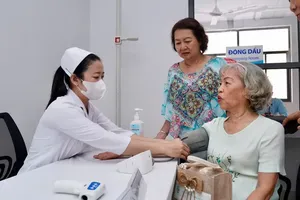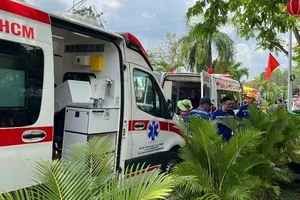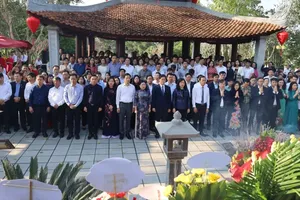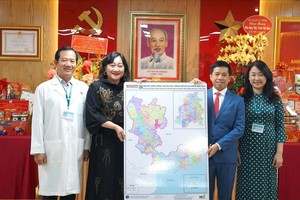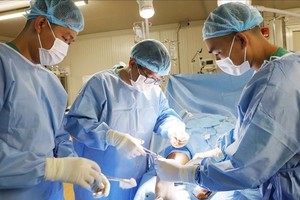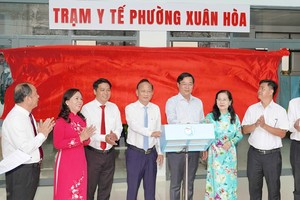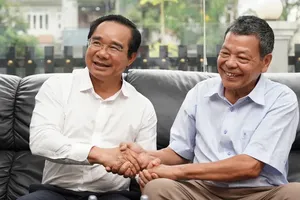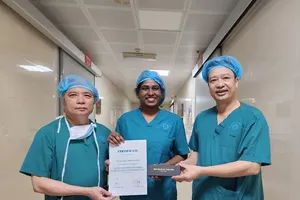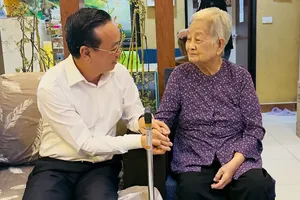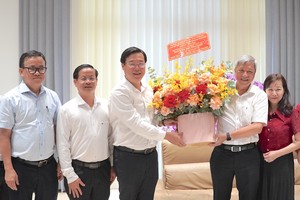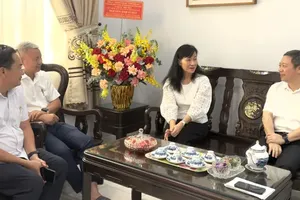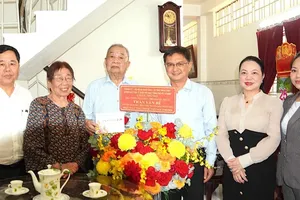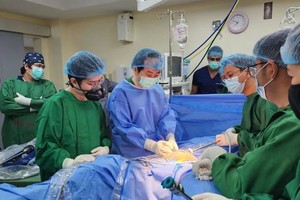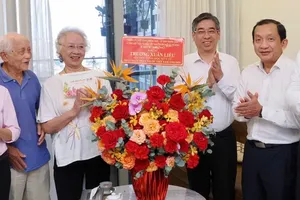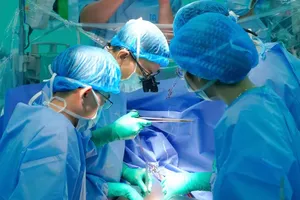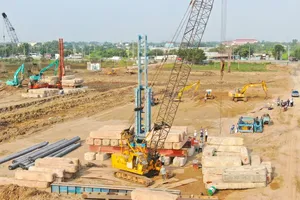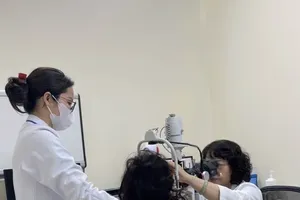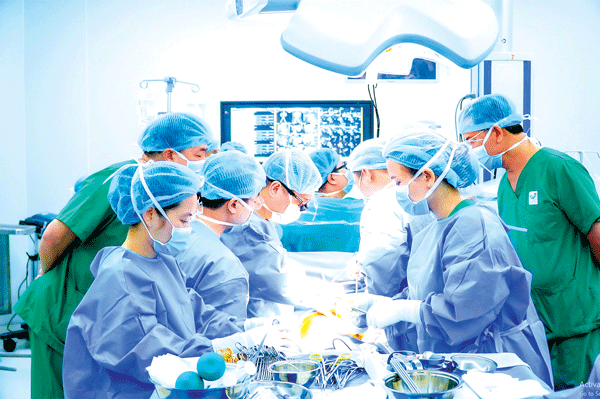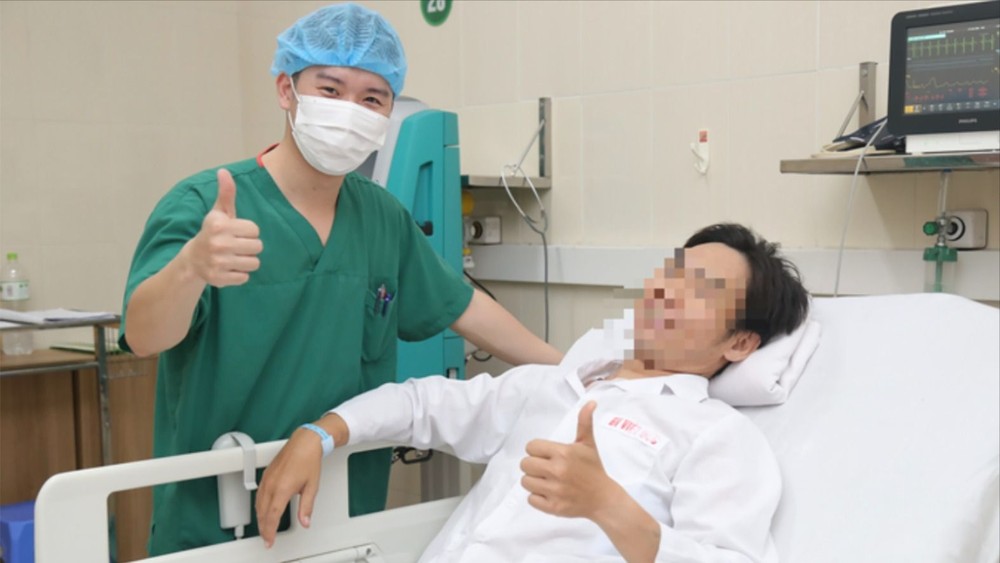
Former Deputy Director of Military Hospital 103 Professor-Dr. Major General Le Trung Hai while paying a visit to the headquarters of SGGP Newspaper in the early days of spring 2024, shared about the achievements the country’s health sector has made in organ transplant in recent times.
Major General Le Trung Hai remembered the difficult early days when late Professor Le The Trung, former Director of Military Medical Hospital 103, who was mainly responsible for performing the first human kidney transplant 32 years ago, and present achievements.
According to him, Major Vu Manh Doan, 40 years old, Chief of Information of the Third Army Corps was the first patient to receive a kidney transplant and the donor was Vu Manh Toan, 26 years old, younger brother of Colonel Doan. The operation took place on June 4, 1992, Major General Le Trung Hai recalled.
With the support of Taiwanese Professor Chu Shu Lee, Asia's leading expert on kidney transplants at that time, Professor Le The Trung and the team of Military Medical Hospital 103 went through 6 hours of extremely difficult surgery, and then everyone burst into joy because the transplant was successful.
Professor Le Trung Hai said that to prepare for the first kidney transplant, Professor Le The Trung and his colleagues sent many students from different specialties to Cuba to study for 6 months. To ensure the successful transplant and the safety of the patient's life and health, Professor Le The Trung and his colleagues also invited foreign experts to provide guidance and help, including Professor Chu Shu Lee. After the first success, Professor Chu Su Lee continued to support subsequent kidney transplants at Military Hospital 103.
With the direct support of Professor Chu Su Lee, subsequent kidney transplants at Military Hospital 103 were carried out successfully, saving many lives of people with organ failures. Along with that, the country's team of surgeons has also learnt a lot from their foreign peers. As for the 9th kidney transplant at Military Hospital 103, Vietnamese doctors completely independently performed it successfully.
Recalling this kidney transplant, Professor Le Trung Hai said that the surgery was performed on July 20, 1993. The patient is a man hailing from Phu Yen Province with end-stage kidney failure and the kidney donor is the patient's biological sister. Up to now, the health of both people is still very good.
It took more than 10 years of preparation for the first human liver transplant surgery in Vietnam which was performed at Le Huu Trac National Burn Institute under Military Medical Academy on January 31, 2004. The liver recipient is 10 year old girl and the liver donor is 31 year old man, Diep's father. This first liver transplant surgery was led by Professor Le The Trung and Professor Le Trung Hai was one of the main surgeons. After more than 19 stressful hours, the liver transplant was successful.
When the first liver transplant was performed, five leading liver transplant experts from Tokyo University (Japan) led by Professor Makuuchi (also Professor Le Trung Hai's teacher) assisted and 120 Vietnamese professors and doctors from many hospitals in the country divided into 5 main surgical teams and 24 service teams took part in.
This liver transplant used about 70 different drugs worth more than US$70,000, and nearly 300 students of the Military Medical Academy volunteered to donate 25 liters of blood for the transplant. The surgery time of the transplant also lasted up to 19 hours.
Professor Le Trung Hai revealed that among organ transplant techniques, liver transplant is very complex and difficult, so the first successful human liver transplant in Vietnam has given big opportunities for people with chronic liver disease which was previously considered an incurable disease with no cure.
After the success of the first liver transplant, the Military Medical Academy continued carrying out heart transplants in 2005. The academy developed an independent state-level project chaired by Professor Pham Gia Khanh on Research on some issues of experimental heart transplants in pigs to advance to heart transplantation in humans in 2007. At the same time, surgeons were performing heart transplants on more than 100 pigs with good results.
The Military Medical Academy has chosen the method of a heart transplant from a brain-dead donor. Although this method is not too complicated, it requires two surgeries to be performed in parallel on the donor and recipient. Especially, the donor must be dead while at that time very few people agreed to donate their organs for medicine. In addition, the academy has sent many doctors to study heart surgery abroad, and invested in equipment, medicine and other necessary supplies.
At the same time, it closely coordinated with domestic heart surgery facilities to attract good surgeons who well perform the techniques and equipment for heart surgery.
After more than 5 years of good preparation, on June 17, 2010, the first human heart transplant in Vietnam was performed at Military Hospital 103. The heart recipient was a 48 year old man who had dilated cardiomyopathy with grade 4 heart failure. Medical treatment proved ineffective for the man who was at high risk of death.
The heart transplant was mainly performed by Vietnamese doctors with the assistance of two experts from Taiwan. After 2 hours, the heart transplant was successful and after 7 days, Mr. Bui Van Nam's health was stable, with monitoring indicators within the normal range.
According to the Ministry of Health and many experts’ assessment, the first successful human heart transplant in Vietnam not only opened up hope for life for people with serious heart disease who had to go abroad for treatment in the past, and worse, many people died.
This event also has an important meaning in continuing to affirm the position of organ transplant science, transferring kidney transplant, liver transplant and heart transplant techniques to other medical facilities in the country. In the future, more new organ transplants such as pancreas transplants, lung transplants, intestinal transplants and multi-organ transplants will be expected to be performed.
